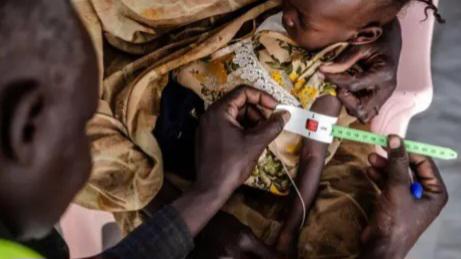The Sudanese Armed Forces (SAF), which claims authority over Sudan, recently allowed 15 UN aid trucks to enter Darfur from Chad to address the ongoing famine. While this move is seen as a potential start to a broader relief effort, many believe it's a minor gesture that might be too late to make a significant impact. The UN's Integrated Food Security Phase Classification (IPC) system reported famine conditions in parts of Darfur a month ago. Sudan is experiencing the world's largest humanitarian crisis, with over half of its 45 million people in urgent need of aid. More than 12 million are displaced, with nearly two million refugees in neighboring countries like Chad, Egypt, and South Sudan. Food security experts warn that up to 2.5 million people could die from hunger by the end of the year. The roots of Sudan's hunger are deep, tied to economic mismanagement, war, and climate-related droughts. The current famine has been exacerbated by the use of starvation as a weapon in the ongoing conflict between the SAF and the Rapid Support Forces (RSF), led by Gen. Mohamed Hamdan Dagolo ("Hemedti"). Since the conflict began in April last year, RSF forces have devastated communities, stripped Khartoum of resources, and damaged critical infrastructure, worsening food shortages. The SAF has employed a strategy of cutting off rebel-held areas to force local supporters into discontent, a tactic it used in the past. Although the SAF controls Port Sudan and is recognized by the UN as the legitimate government, the aid flow is hindered by bureaucratic delays and limited access. In June, Sudan's UN ambassador dismissed famine claims as conspiracy and threatened severe consequences if the UN declared famine. Despite this, the IPC confirmed the famine and the SAF eventually allowed limited aid to cross the border, but only under strict conditions. Peace talks in Geneva, aimed at resolving the conflict and easing the aid process, ended with minimal progress. The talks, led by the US and Saudi Arabia, failed to produce a ceasefire agreement, and efforts to negotiate a humanitarian truce are ongoing. The rivalry between regional powers, notably Saudi Arabia and the UAE, is complicating the peace process, with each supporting different factions in the conflict. As fighting continues and hunger worsens, there is little hope for a swift resolution, and the humanitarian crisis deepens. More at:www.ninaworldnews.com.
Get updates delivered to you daily. Free and customizable.
Sudan faces famine as peace talks collapse once more.
Nina Effiom
Comments / 0
Add a Comment
YOU MAY ALSO LIKE
 Most Popular
Most PopularNina Effiom11 days ago
Nina Effiom12 days ago
Atlanta, GA21 days ago
Nina Effiom11 days ago
Nina Effiom4 days ago
Georgia State12 days ago
Nina Effiom11 days ago
J. Souza11 days ago
Cheyenne, WY16 days ago
Georgia State1 day ago
Nina Effiom8 days ago
Get updates delivered to you daily. Free and customizable.
It’s essential to note our commitment to transparency:
Our Terms of Use acknowledge that our services may not always be error-free, and our Community Standards emphasize our discretion in enforcing policies. As a platform hosting over 100,000 pieces of content published daily, we cannot pre-vet content, but we strive to foster a dynamic environment for free expression and robust discourse through safety guardrails of human and AI moderation.


Comments / 0